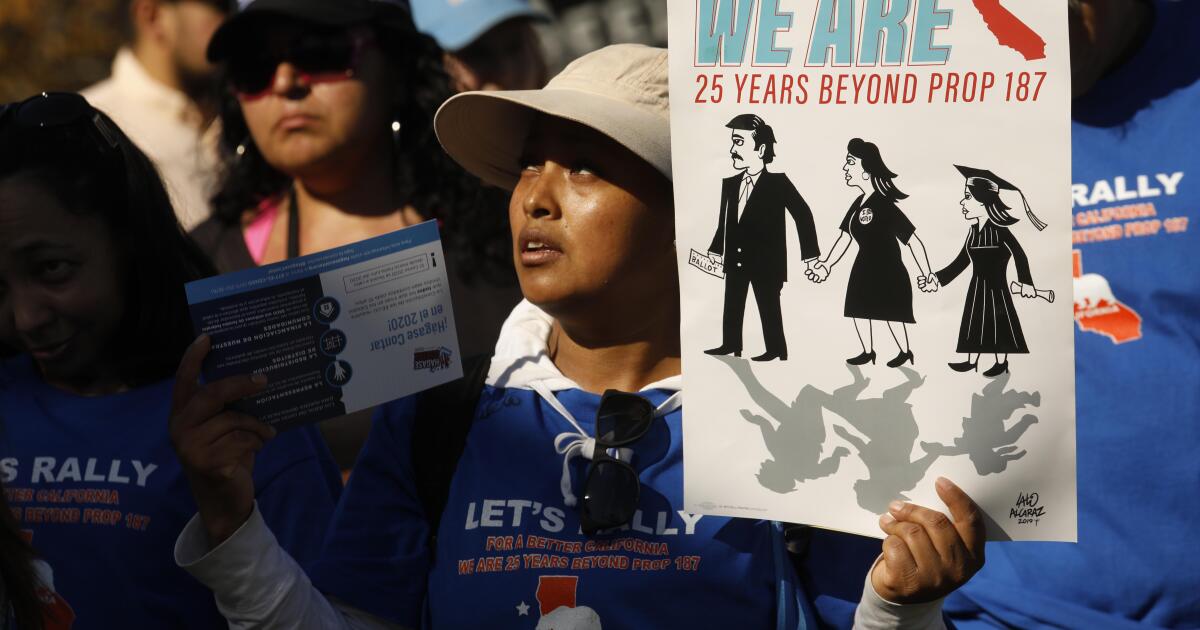
The Democratic Party and its presidential candidate Kamala Harris should stop touting “border security” and propose a new approach to the immigration debate, firmly rooted in American values of justice, opportunity, and truth.
The contrast with Donald Trump should be easy to make: The former president is promising to carry out the “largest mass deportation” in the country’s history and to issue an executive order denying birthright citizenship to any child born to undocumented residents of the United States. These measures would have a devastating impact on millions of people, many of whom have lived in the United States for decades. They would wreak havoc on our economy, which not only depends on immigrants, both documented and undocumented, but is sustained by them. And they would irreparably tarnish our moral reputation as a leader in human rights around the world.
If the Republican Party’s embrace of exclusion is frightening, Democrats’ embrace of policies that falsely equate border security with more restrictive asylum regulations, including President Biden’s executive order in June that closes the border to asylum seekers when numbers reach certain limits. The hope seems to be that an approach somewhat less cruel than mass deportations will satisfy immigrant sympathizers but also steer some potential MAGA supporters away from the xenophobic abyss.
Harris seems to have adopted this strategy with her now infamous remarks of 2021 She told Guatemalans, “Don’t come … If you come to our border, you will be turned away.” While that may have been more of a statement of fact than a threat, it revealed a serious lack of understanding of the forces that drive migrants from their homes. It also damaged her credibility — and that of the administration — with immigrant communities; a “big flaw,” as a University of California, Irvine, political scientist told the Times. Her latest talking points — emphasizing drug cartel prosecutions and the border enforcement bill that Republicans rejected earlier this year — lean in the same anti-immigrant direction.
So what should Harris say and do? To borrow her own slogan, she should argue that “we are not coming back“Divisive politics and ‘build the wall’ attitudes are commonplace. Harsh rhetoric against immigrants has a short political shelf life. In California, we know this story firsthand.
This year marks the 30th anniversary of the state’s passage of Proposition 187 in 1994, a measure that sought to prevent undocumented immigrants in California from accessing basic services, including health care and public education for their children. The measure required every teacher, school nurse, firefighter, and police officer to report anyone they suspected of being undocumented. The initiative was suspended and eventually ruled unconstitutional by federal courts, but even without taking effect, it sparked a counteroffensive on behalf of all Californians.
Three decades later, California’s political terrain has changed so much that the state has expanded earned income tax credits, university tuition programs And health insurance More importantly, it is now nearly impossible for an anti-immigrant candidate to win statewide office.
The move away from exclusion didn’t happen by itself. It initially sparked a tug-of-war between California moderates and progressives over how to combat anti-immigrant fear and fervor, with some advocating a defensive stance similar to the one Harris is taking today.
What prevailed was a grassroots effort to build a multiracial, cross-sector coalition of support for common-sense policies in a sanctuary state. For example, when anti-immigrant jurisdictions began using traffic stops to criminalize noncitizens—upsetting families, communities, and entire sectors of the economy, not to mention traffic—the coalition passed Assembly Bill 60, after a decade-long battle, in 2013, giving undocumented immigrants access to a special driver’s license.
Along the way, the benefits of inclusion have been demonstrated for the state. As the Times reported last week, international migrants have “boost[ed]” the U.S. and California economies, creating jobs and “injecting millions of tax dollars” into state coffers.
Indeed, Golden State politicians are now likely to remind their audiences that state economy — the fifth-largest state in the world — is home to more than 10 million immigrants with a purchasing power of $383 billion, and 40 percent of the state’s entrepreneurs are immigrants. Even undocumented immigrants are a proven boon: nationally, they contribute $13 billion more per year to the social security system that they will not even be able to withdraw.
California’s abandonment of Proposition 187 can and should be exported nationally. It is a perfect opportunity for any politician, and especially Harris and the Democrats, to look to the future.
Polls show Despite the attacks on their very existence, immigrants and their children are largely optimistic, which stands in stark contrast to the somber tones of a MAGA movement that believes America can only be great if it returns to a mythical, all-white past. Harris should wholeheartedly embrace a more optimistic vision of America, rooted in facts that prove the contributions of immigrants, rather than being tempted to endorse Trump’s hateful agenda in any way.
We are both children of formerly undocumented parents. We know that immigrants enrich our society and that demonizing newcomers is morally and factually wrong. A courageous and bold commitment to inclusion will strengthen America, reflect the values of a democratic and diverse nation, and bring us closer to realizing the American Dream that so many, especially immigrants, aspire to.
Manuel Pastor is a professor of sociology and director of the Equity Research Institute at USC. Miguel Santana is president and CEO of the California Community Foundation.


